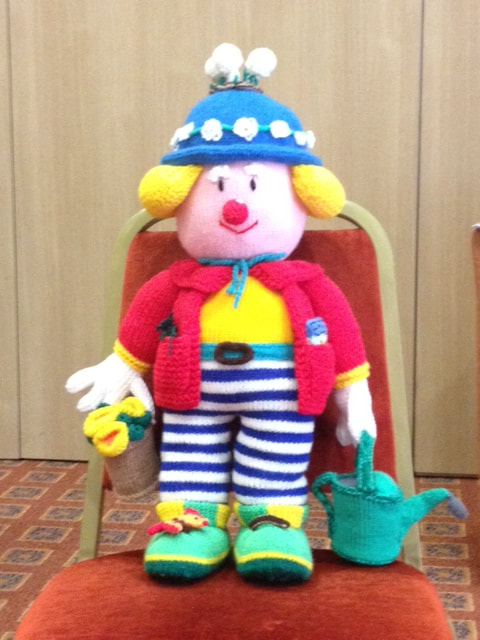LESSON 6
LESSON 6
What's your Knitting? (Fiona's Story)
On a recent workshop, I asked people what they were really good at. One particularly lady called Fiona struggled with the question.
'I'm not really good at anything'. she said. ‘I left school when I was 16 and got married. I have spent the last 18 years looking after my husband and our one son. He is now leaving for college and to be honest I just don't know what to do in the future. I have no qualifications. I have never worked in an organisation.'
It became clear that Fiona was effectively 'grieving' for the forthcoming loss of her son who was leaving home to go to university.
'Well, Fiona' I said. 'Everyone is good at something. So, tell me what you like to do at home or in your spare time. Have you any hobbies, for example? 'The only thing I do' she replied, ‘is a bit of knitting’. I asked her to bring in something that she had knitted.
The next day Fiona brought in a large Farmer doll called (Fred!) that she had knitted. He had a blue watering can with water coming out of the spout in one hand and a bucket of brightly coloured flowers in the other. Four or five people in the room immediately wanted to buy one for their child or grandchild.
I asked the group 'How can Fiona make money out of Fred the farmer?'
'She could sell him' was the general response.
'Yes, I said but she doesn't want to sell him. Why?’
The answer was easy when they thought about the work involved. 'Because she's only going to get a certain amount of money and it takes a week for her to knit him.'
'Correct. So, what else could she do?' I asked.
'She could get other people to knit for her - but there may not be a lot of money in it for her by the time she has paid them.'
‘Ok, good - so how else could Fiona make money out of Fred the Farmer?’, I said pushing the group for more creative answers.
'She could sell the pattern on eBay.' came the response after a few seconds.
'Great!', I replied.
Fiona went off and typed up the pattern and put it onto eBay with a picture of Fred the Farmer. She only had to do this once - and after this was then selling multiple copies of the pattern every week at 9.99 a time.
'I'm not really good at anything'. she said. ‘I left school when I was 16 and got married. I have spent the last 18 years looking after my husband and our one son. He is now leaving for college and to be honest I just don't know what to do in the future. I have no qualifications. I have never worked in an organisation.'
It became clear that Fiona was effectively 'grieving' for the forthcoming loss of her son who was leaving home to go to university.
'Well, Fiona' I said. 'Everyone is good at something. So, tell me what you like to do at home or in your spare time. Have you any hobbies, for example? 'The only thing I do' she replied, ‘is a bit of knitting’. I asked her to bring in something that she had knitted.
The next day Fiona brought in a large Farmer doll called (Fred!) that she had knitted. He had a blue watering can with water coming out of the spout in one hand and a bucket of brightly coloured flowers in the other. Four or five people in the room immediately wanted to buy one for their child or grandchild.
I asked the group 'How can Fiona make money out of Fred the farmer?'
'She could sell him' was the general response.
'Yes, I said but she doesn't want to sell him. Why?’
The answer was easy when they thought about the work involved. 'Because she's only going to get a certain amount of money and it takes a week for her to knit him.'
'Correct. So, what else could she do?' I asked.
'She could get other people to knit for her - but there may not be a lot of money in it for her by the time she has paid them.'
‘Ok, good - so how else could Fiona make money out of Fred the Farmer?’, I said pushing the group for more creative answers.
'She could sell the pattern on eBay.' came the response after a few seconds.
'Great!', I replied.
Fiona went off and typed up the pattern and put it onto eBay with a picture of Fred the Farmer. She only had to do this once - and after this was then selling multiple copies of the pattern every week at 9.99 a time.

Key Point - Work Once
There is a very important lesson for us here. Most of us are used to working and getting paid for our time. We repeat this process week after week. We work, we get paid and we spend it. We work, we get paid and we spend it.
But this is not how rich people work. They do not work for money. They work to create assets. It is the assets that work to bring in income.
An example is of course a house that you own and then rent out to other people which brings you in a monthly rental income. In Fiona's case the asset is the knitting pattern which brings in weekly income. She only had to work once to create the knitting pattern.
Fiona had her first passive income product from something she loved to do.
But this is not how rich people work. They do not work for money. They work to create assets. It is the assets that work to bring in income.
An example is of course a house that you own and then rent out to other people which brings you in a monthly rental income. In Fiona's case the asset is the knitting pattern which brings in weekly income. She only had to work once to create the knitting pattern.
Fiona had her first passive income product from something she loved to do.
Product number two
When Fiona's son John saw what was happening, he said 'Mum, let's create a video of you knitting Fred the Farmer!'
So using his camera phone John made a series of short videos – one with Fiona knitting the watering can, one with Fiona knitting the bucket of flowers, etc. John put these videos as a video course onto a DVD and Fiona had her second product. Fiona had her second passive income stream on eBay.
Other participants on the 'Work it Out! workshop then said we need to find some graphic students and we need to find some English students to help us. They started to make enquiries of the local colleges. Why did they want to find graphic students and English students?
The graphic students were to help with developing further characters for Fiona – Fred's family! And the English students were to write the children's stories based on the characters.
So, within a few weeks the lady who had no experience, had never worked and had no qualifications was running a ‘global’ passive income business.
But for Fiona this was not just about money. It was about a sense of self-worth and finding a new role that she could be happy with. Fiona is now working in residential homes teaching older people how to knit and listening to them as they share their stories. Fred the Farmer helped to make this happen.
Key Point - Stepping Stones
Often our initial workpieces are not the jobs or roles we end up with. In many ways they are stepping stones to where we are going. But we need these stepping stones or we stay stuck waiting for the big opportunity.
Fiona's ebay experience gave her a real sense of value that she had something to offer and it helped her to share her knitting skills with others who needed help.
Fiona's ebay experience gave her a real sense of value that she had something to offer and it helped her to share her knitting skills with others who needed help.
Fiona developed her future around her one great interest – knitting.
Fiona developed her future around her one great interest – knitting.
- She knitted one doll – Bertie Bloomer
- She created a knitting pattern and then sold this (her first product) every week on ebay.
- She created some videos showing how she knitted different parts of ‘Bertie’ - and then had more products to sell.
- She worked with others to create more characters and built her website.
- She worked with English students to write children’s stories.
- Fiona's initial workpieces in ebay and video gave he important stepping stones.
- Fiona now runs knitting classes in residential homes across Ireland.





